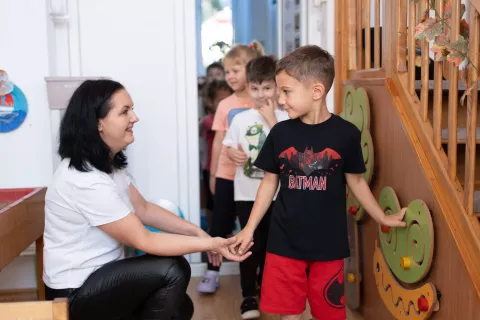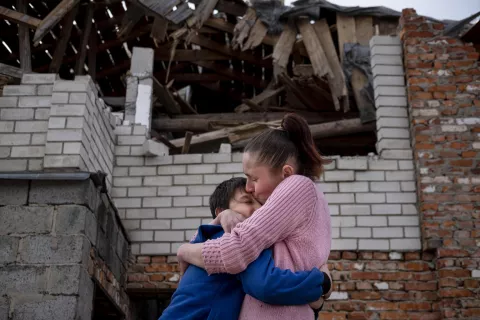Every child and adolescent’s mental health must be a priority for decision makers and stakeholders in every community - UNICEF

- Available in:
- English
- Română
Bucharest, 10 October 2023. On World Mental Health Day, celebrated on 10 October, UNICEF reaffirms the right of every child to good mental health and wellbeing, and the need for investment in every community to make this right a reality for children and young people.
The mental health of children and adolescents has an impact on many aspects of their lives. According to a UNICEF snapshot report on child and adolescent mental health in Romania published in September 2022, besides social stigma and discrimination, in some cases children and adolescents experiencing mental health problems are at risk of unhealthy, risky behaviors such as smoking, alcohol and drug use or risky sexual behaviors. Academic performance can also be affected, for example, a child with a conduct disorder who does not receive specialist intervention is twice as likely to drop out of school than a typically developing child, compared to other children.
At global level, according to the 2021 UNICEF’s The State of the World’s Children; On My Mind: promoting, protecting and caring for children’s mental health report, more than 1 in 7 adolescents aged 10–19 is estimated to live with a diagnosed mental disorder. An estimated 86 million adolescents 15–19 years old and 80 million 10–14 years old live with a mental disorder worldwide.
In Romania, about 22,000 children and adolescents are living with a mental illness diagnosis, and many others are facing various developmental, emotional or cognitive disorders. It is estimated that a much higher number of people with psycho-emotional needs are undiagnosed and consequently do not receive any appropriate mental health treatment and care.
The UNICEF snapshot report states that the mental health of Romanian children and teenagers is much more impacted than that of children in other countries. 33% of 11 to 15 years old teenagers feel sad more than once in a week, compared with an average of 13% in the 45 countries included in a World Health Organization study. Also, a 2020 study showed that almost half of young people had thoughts of suicide at least once, 27.1% were sad all the time and could not escape sadness, and 21.5% felt depressed at times in the last six months[1].
In Romania, among the most common mental disorders diagnosed in recent years are: conduct disorders (24.19%), attention deficit hyperactivity disorder (22.65%), anxiety disorders (19.23%), autism spectrum disorders (14.47%), depressive episode (9.14%), attachment disorders (4.3%), school phobia (3.10%) and eating disorders (2.88%). Depressive episodes in the 15+ age group were 69%, much higher compared to those reported at younger ages.
The authors of the UNICEF report have developed also a policy paper containing a set of recommendations to improve the quality of children’s lives from the mental health perspective. One recommendation refers to addressing the issues related to the insufficient statistical data on child and adolescent mental health in Romania. The lack of reliable information on children's access to specialist healthcare services, to psychotherapy, psychological counselling, educational support services or social services makes it difficult to tailor interventions aimed to reduce the complexity of mental impairment and foster a positive and productive health status.
Another set of recommendations refers to schools, which do not have mental health promotion programs. The research notes that mental health has a significant educational component, and the development and implementation of psycho-education programs for children and adolescents can have a transformative potential for the whole community. One recommendation is the introduction of psycho-educational content at each educational level and developing this content to include non-formal methods, in a child-friendly manner and in line with children's current needs. Also teachers should be trained to disseminate psycho-educational content in schools.
For refugee children or children and adolescents in rural areas or in underprivileged areas, access to mental health services is more difficult. The existing system is difficult to access by refugee children and adolescents, who have urgent and specific mental health needs. Mental health services for vulnerable children should be ensured by funding e-medicine, e-counselling, e-therapy services or mobile mental health clinics. Public mental health services need to be extended to meet the real mental healthcare needs of children and adolescents in geographical areas and settings where such services are insufficient, if any. Financial support for vulnerable families with children with mental health problems should be provided, so they can access mental health services on a regular basis.
UNICEF is calling for urgent investment in child and adolescent mental health, supporting prevention measures in the family through programmes promoting positive parenting, but also to support caregiver well-being. The community and school response is also important for mental health, as children and adolescents should learn and live in safe environments. UNICEF is focusing on the changing the global conversation and public perception on mental health, tackling stigma and discrimination.
“Every child has the right to good mental health and wellbeing. The realization of their rights depends on this, and we must make sure we put in place all the right policies and we have the resources necessary to provide the best services, for all children in Romania, but especially for vulnerable and refugee children”, said Anna Riatti, UNICEF Representative in Romania.
According to a recent U-Report poll (July 2023) in Europe, almost one third of adolescents characterize their overall emotional state in the last half year as “anxious”, while another third would call it “stressed”. 56% o the respondents said that they take their main source of information on how to take care of their mental health from the internet and social media, 8 to 9 percent indicated friends and relatives, while 14% don’t have any source of information. 41% of adolescent responded that people who support them can improve their psychological state. 26% indicated that better financial conditions can improve their psychological state.
[1] Sex, alcool, marijuana și depresie in rândul tinerilor din Romania. Studiu național cu participarea a peste 10.000 de tineri si 1.200 de părinți, Ed. Universitară, Bucharest 2020
Media contacts
About UNICEF
UNICEF promotes the rights and wellbeing of every child, in everything we do. Together with our partners, we work in 190 countries and territories to translate that commitment into practical action, focusing special effort on reaching the most vulnerable and excluded children, to the benefit of all children, everywhere.
For more information about UNICEF and its work for children, visit www.unicef.org.




